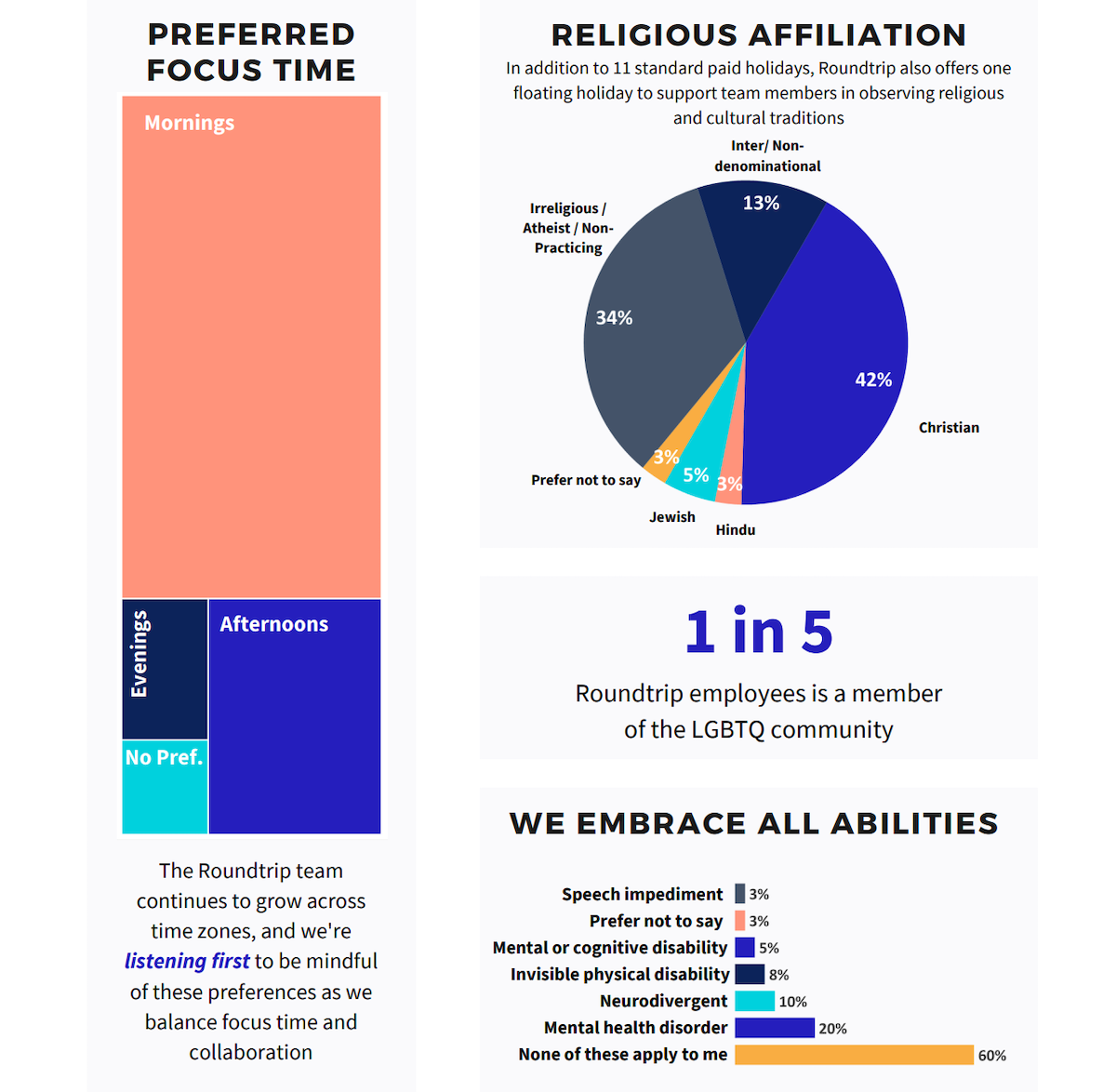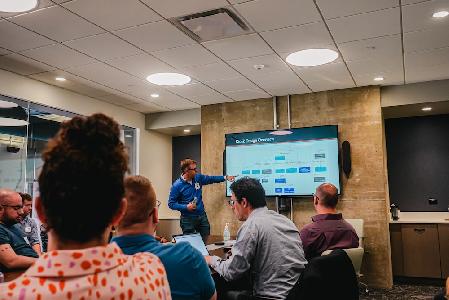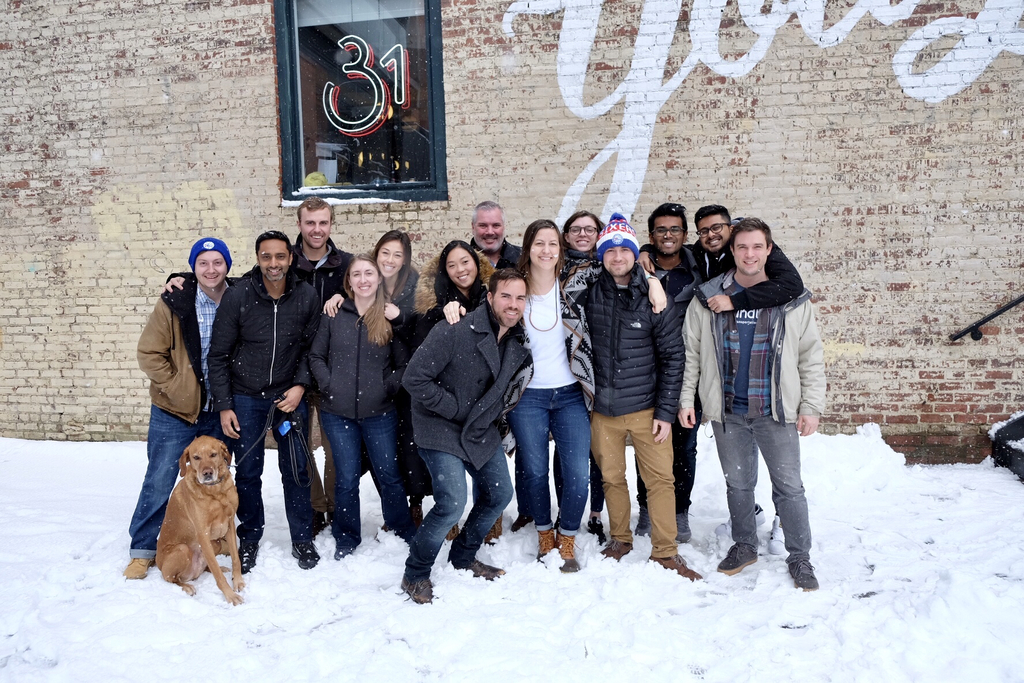
This editorial article is a part of Racial Equity in Tech Month 2022 of Technical.ly's editorial calendar. This month’s theme is underwritten by Spotify. This story was independently reported and not reviewed by Spotify before publication.
Company leaders who choose to engage in conversations with their employees about diversity, equity and inclusion strategies know those conversations can feel clumsy or start from an uncomfortable place.
In the wake of the rising Black Lives Matter movement in 2020, Roundtrip founder and CEO Mark Switaj decided it was no longer appropriate for the Callowhill-based company to stay quiet on issues of race or current events. It was more important, he thought, to take a hard look at the company’s hiring and operating practices in order to be as inclusive and representative as possible.
While Switaj said he recognizes that diverse teams are better for business, he also wanted the company to better represent the population the healthcare transportation company serves.
“We wanted to make sure we were telling our story,” the CEO told Technical.ly. “Large tech brands were showing maybe skewed perspectives, but for populations we serve, most of our clients are lower socioeconomic communities and the elderly.”
Beginning to track diversity
So for the first time in 2020, Switaj executed a company survey to better understand Roundtrip’s internal makeup. It asked its nearly 50 employees about race, gender and sexual identity; education levels; ZIP code; and religious affiliations. It also wanted to learn things about the employee experience, like if someone had a “preferred focus time.” An 11-page report was created from the results, showing the company was 68% white, 8% Black, 8% South Asian, 8% East Asian, 5% Latinx and 3% Native.
“Previously, I was taught that it was better to acquiesce on social issues than to address them. With the continued conversations around the Black Lives Matter movement, I now know that silence is the opposite of change,” Switaj wrote in the report’s intro. “I fumbled over my words, I felt uneasy, yet through that discomfort, understanding followed.”
The report also showed the company was made up of nearly the same amount of people who identified as Christians (38%) as non-religious (32%), and that 9% were Hindu, 15% were Jewish and 6% didn’t identify. Beyond this, 42% of employees in 2020 were women, 39% had a master’s degree and 24% were parents or legal guardians.
DEI-minded changes to Roundtrip’s hiring practices
With this data as a starting point, Roundtrip began seeking out inclusive hiring best practices. Switaj said the company leaned on the networks of Gaingels, an LGBTQIA+ investment syndicate, and InHerSight, a women-focused job seeking platform, to find and nurture talent. The company went to OneDigital for DEI training on how hiring managers can use inclusive language and outreach to find more diverse candidates. It also took a hard look at its engineering team, which skewed heavily white and male, and began posting on diversity-focused job boards and spoke to different circles to recruit.
Switaj said he also took to heart some criticisms that year. One investor told him his leadership team was too white and too male, and a DEI workforce screener called out language in job applications that was flagged as off-putting to women. Switaj himself had written the description, he said, and that critique was eye-opening.
The 2020 survey data also influenced some internal policy changes. Leadership removed the requirement of a college degree for many open roles, and the company healthcare plan now fully covers an employee’s benefits. The leadership team is also currently taking a look at parental leave for non-birthing parents.
The results
In 2021, Roundtrip surveyed its team again. This year, 78% of its team was white, 7% Black, 5% South Asian, 5% East Asian and 5% Latinx. The report acknowledges that the team got less racially diverse, and called out additional focus areas for the future. That includes reworking experience, gender and education bias from job ads; expanding its adoption of the ParityPledge; and engagement and retention strategies.
However, the company’s gender and educational diversity increased. This year, 56% of employees identified as women, and 13% of employees did not have a college degree. The number of parents or legal guardians drastically increased to 49% of employees. And a few new prompts revealed that 20% of the company identified as LGBTQIA+. Another 10% of employees said they were neurodivergent, 20% reported having a mental health disorder and 13% reported having some sort of disability.

From Roundtrip’s 2021 DEI survey report. (Courtesy image)
What’s next for Roundtrip?
While the results were a mixed bag — growth in some areas and continued room to grow in others — Switaj said he feels lucky to continue learning about the team.
“To be incredibly selfish, I thought I was one of the only gays in the company,” the CEO said. “It’s exciting to see in 2022, one, that folks feel comfortable clicking the buttons, but two, that they’d identify.”
The surveys have reinforced the feeling Switaj had two years ago that silence during life-altering events isn’t the answer. In a different survey, he said, 70% of the workforce said they want to hear from Roundtrip during current events and that they want the company to take a stance.
“What I’ve learned is that you can’t manage what you can’t measure,” Switaj said. “How can you lead a diverse workforce if you don’t know the composition if it? We have found at Roundtrip by measuring, we knew we had the opportunity to develop into the company we wanted to be.”
Join the conversation!
Find news, events, jobs and people who share your interests on Technical.ly's open community Slack

Philly daily roundup: Student-made college cost app; Central High is robotics world champ; Internet subsidy expiration looms

Philly daily roundup: Earth Day glossary; Gen AI's energy cost; Biotech incubator in Horsham

Gain knowledge and skills at the Technical.ly Developers Conference during Philly Tech Week 2024


